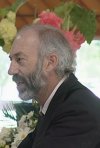 »
Archives
»
Open Poetry #38
»
Looking Seaward
»
Archives
»
Open Poetry #38
»
Looking Seaward
| Open Poetry #38 |


|
Looking Seaward |



|
|
poettothecars Senior Member
since 2006-02-10
Posts 1093New Zealand 
|
This one relates to people of a similar name, past and present and should not be taken in the wrong light. 5411 Looking Seaward 22 May 2006 As if Susan was a light a lamp to days borne No shadow to shade a heart just a beginning, as if another of depart Yeats or Keats, did it make any difference to Wordsworth For who were they, modern or dead another understanding, an interpretation said This love, lost in a lust-less existence a luxuria, combatant in sins void No God could steal this given to be free verses of vigorously passion, admired in thee Of a Susan yesterday a scurrility of today Neither of truth or obscenity but pure in charity of kind “What more felicity can fall to creature, “Than to enjoy delight with liberty.” Fate of the Butterfly.—SPENSER From the dedication of the book “Poems by John Keats” (1795–1821). Published in London, England by Macmillan in 1884. Edmund Spenser (c. 1552–13 January 1599) was an English poet and Poet Laureate. William Butler Yeats (1865-1939), Irish poet, dramatist and prose writer. William Butler Yeats was born on 13 June 1865 in Dublin, Ireland in being regarded as one of the greatest English- language poets of the 20th century. Yeats received the Nobel Prize for Literature in 1923. Yeats died on 28 January 1939 at the Hôtel Idéal Séjour, in Menton, France. William Butler Yeats was intrigued by the contrast between the “deliberate happiness” of Keats’s poetry and the sadness that characterised his life. John Keats (1795–1821): Said to be one of England’s greatest poets, Keats was a key element in the Romantic Movement. Keats was born in Finsbury Pavement in London, where his father, Thomas Keats died in 1804, from a fractured skull after falling from his horse. In 1810, Keats mother died of tuberculosis, leaving him and his siblings in the custody of their grandmother. John Keats died aged 25, in Italy, on 23 February 1821 and was buried in the Protestant Cemetery, Rome, Italy. His last request was followed, and thus he was buried under a tomb stone reading “Here lies one whose name was writ in water.” William Wordsworth (1770-1850), British poet, credited with ushering in the English Romantic Movement with the publication of Lyrical Ballads (1798) in collaboration with Samuel Taylor Coleridge (1772-1834). William Wordsworth was born on 17 April 1770 in Cockermouth, Cumberland, England in the Lake District. His father was John Wordsworth, an attorney. The magnificent landscape deeply affected Wordsworth’s imagination and gave him a love of nature. He lost his mother when he was eight and five years later his father. The domestic problems separated Wordsworth from his beloved and neurotic sister Dorothy, who was a very important person in his life. In 1795 he met Coleridge. Wordsworth’s financial situation became better in 1795 when he received a legacy and was able to settle at Racedown, Dorset, with his sister Dorothy. Encouraged by Coleridge and stimulated by the close contact with nature, Wordsworth composed his first masterwork, Lyrical Ballads, which opened with Coleridge’s “Rhyme of the Ancient Mariner.” About 1798 he started to write a large and philosophical autobiographical poem, completed in 1805, and published posthumously in 1850 under the title The Prelude. Wordsworth spent the winter of 1798-99 with his sister and Coleridge in Germany, where he wrote several poems, including the enigmatic ‘Lucy’ poems. After returning to England, he moved Dove Cottage, Grasmere, and in 1802 married Mary Hutchinson. They cared for Wordsworth's sister Dorothy for the last 20 years of her life. In 1843 he succeeded Robert Southey (1774-1843) as England's poet laureate. Wordsworth died on April 23, 1850. © 2006 Christopher W Herbert (a New Zealand Poet) a poet who cares |
||
| © Copyright 2006 Christopher W Herbert - All Rights Reserved | |||
|
Bodger Senior Member
since 2005-06-12
Posts 1260Tolerance for a short time |
A line to a url rather than copy the words might be an idea. The Masters yes, but Thomas Hood will tend to be my poet He wrote in London and you can argue 'his words suffered by this' but I don't feel he ever managed to fight through the barriers that enable others to hop across to other environments as some other poets could. Dave |
||
|
poettothecars Senior Member
since 2006-02-10
Posts 1093New Zealand |
My poem comes with explanatory footnotes, which is the reason for what comes in the total package. While it might be such that there are those on this site, that may know and not need such footnotes. My writing is presented in a way to appear to a general audience and I believed the material and length of the footnote all belonged together. So what you see is what you get, even if in truth, no one reading my poem will ever know the reasons being my own thoughts in direct relation to what I wrote as a poem. Thank you kindly for your input a poet who cares |
||


|
⇧ top of page ⇧ |



|
| All times are ET (US). All dates are in Year-Month-Day format. | ||